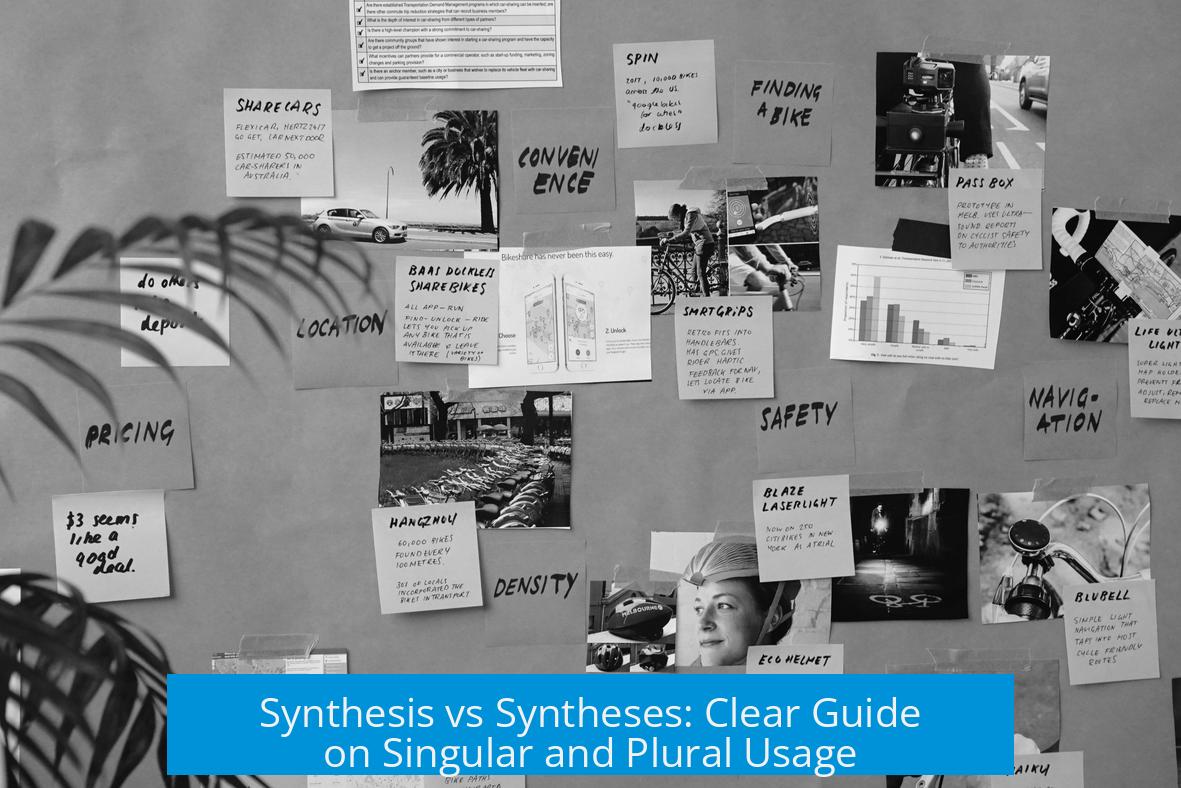Synthesis vs Syntheses – When to Use Singular and When to Use Plural?
The term synthesis is singular and used when referring to one complete chemical process, regardless of how many products are involved. In contrast, syntheses is the plural form and applies when discussing multiple distinct synthesis processes or comparing various methods.
Understanding “Synthesis” (Singular)
The word synthesis denotes a singular chemical process or mechanism. This can be a multi-step procedure that leads to the creation of a compound. It does not depend on the number of products produced but the process itself being a single unified act.
- Used when mentioning one process, e.g., synthesis of vanillin.
- Applicable when the process, rather than the products, is the focus.
- Common in phrases such as the x-step synthesis of Y product(s) where product plurality is irrelevant.
For example, the synthesis of aspirin refers to one defined sequence of steps to produce that molecule. Even if multiple aspirin tablets are produced, synthesis remains singular since it describes one overarching process.
When to Use “Syntheses” (Plural)
Syntheses applies when discussing more than one separate synthesis process. It often appears in scientific contexts comparing or listing various synthesis methods or when multiple procedures are necessary to obtain sufficient product quantities.
- Refer to multiple processes, e.g., multiple syntheses might be necessary.
- Used in general discussions about synthesis methods, such as these syntheses are useful for X reasons.
- Common in comparative statements, e.g., the syntheses of compound X and compound Y differ significantly.
For instance, a chemist may perform several different syntheses of a peptide to optimize yield or purity. Here, the plural form correctly reflects multiple distinct procedures rather than one.
Clarifying the Verb-Noun Issue
Synthesis is a noun derived from the verb to synthesize. The noun represents the process or act of synthetically combining components to form a product. Using “synthesis” as a verb is grammatically incorrect.
Despite this, some confusion arises because expressions such as the x-step synthesis of Y product(s) discuss the process akin to a verbal action. However, “synthesis” always remains a noun, describing the singular procedure that results from synthesizing.
Summary Table: When to Use “Synthesis” vs. “Syntheses”
| Usage Condition | Word to Use | Example |
|---|---|---|
| Referring to one specific process | synthesis (singular) | “Synthesis of vanillin” |
| Process is singular; product plurality irrelevant | synthesis (singular) | “The x-step synthesis of Y product(s)” |
| Referring to multiple distinct processes or methods | syntheses (plural) | “Multiple syntheses might be necessary” |
| Discussing different synthesis processes | syntheses (plural) | “Comparing X synthesis to Y synthesis; the syntheses make the same product” |
Examples in Chemical Contexts
In organic chemistry, you might read statements like:
- The synthesis of ibuprofen requires several catalytic steps. (Refers to one chemical path.)
- Different syntheses of ibuprofen exist, each with varying efficiency. (Refers to multiple methods.)
- Multiple syntheses were performed to confirm the compound’s purity. (Refers to repeated or varied procedures.)
Each usage depends strictly on whether the focus is on one process or multiple processes.
Key Points to Remember
- Synthesis always refers to one process, regardless of how many products it yields.
- Syntheses refers to multiple distinct chemical processes or methods.
- Synthesis is a noun, never a verb; the verb form is to synthesize.
- The plurality of the products does not affect whether you use singular or plural; it depends on the number of processes.
- Use synthesis when describing a specific multistep procedure.
- Use syntheses when discussing varied or repeated processes.





Leave a Comment